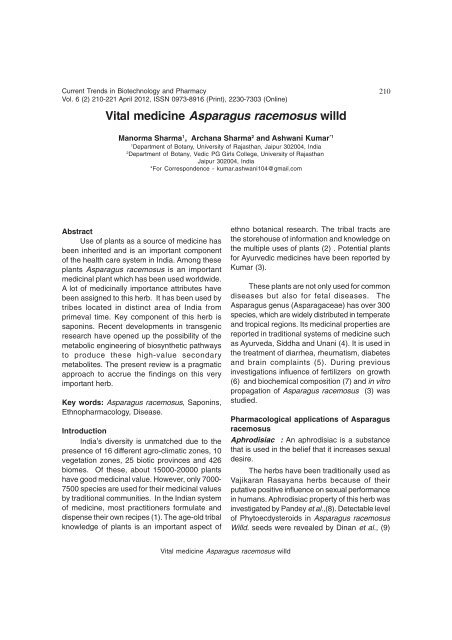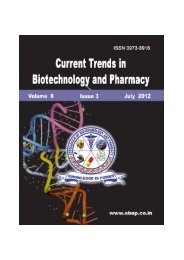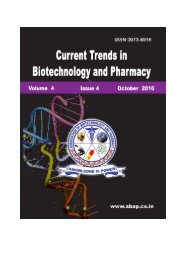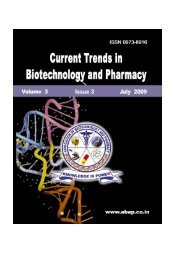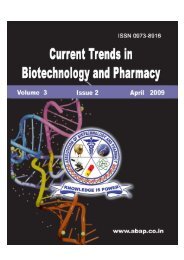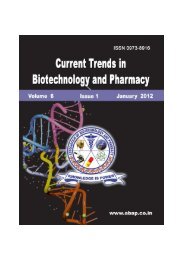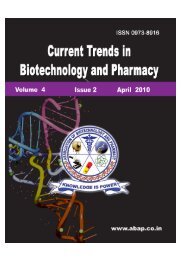d(GC) - Association of Biotechnology and Pharmacy
d(GC) - Association of Biotechnology and Pharmacy
d(GC) - Association of Biotechnology and Pharmacy
You also want an ePaper? Increase the reach of your titles
YUMPU automatically turns print PDFs into web optimized ePapers that Google loves.
Current Trends in <strong>Biotechnology</strong> <strong>and</strong> <strong>Pharmacy</strong><br />
Vol. 6 (2) 210-221 April 2012, ISSN 0973-8916 (Print), 2230-7303 (Online)<br />
Vital medicine Asparagus racemosus willd<br />
Manorma Sharma 1 , Archana Sharma 2 <strong>and</strong> Ashwani Kumar *1<br />
1 Department <strong>of</strong> Botany, University <strong>of</strong> Rajasthan, Jaipur 302004, India<br />
2 Department <strong>of</strong> Botany, Vedic PG Girls College, University <strong>of</strong> Rajasthan<br />
Jaipur 302004, India<br />
*For Correspondence - kumar.ashwani104@gmail.com<br />
Abstract<br />
Use <strong>of</strong> plants as a source <strong>of</strong> medicine has<br />
been inherited <strong>and</strong> is an important component<br />
<strong>of</strong> the health care system in India. Among these<br />
plants Asparagus racemosus is an important<br />
medicinal plant which has been used worldwide.<br />
A lot <strong>of</strong> medicinally importance attributes have<br />
been assigned to this herb. It has been used by<br />
tribes located in distinct area <strong>of</strong> India from<br />
primeval time. Key component <strong>of</strong> this herb is<br />
saponins. Recent developments in transgenic<br />
research have opened up the possibility <strong>of</strong> the<br />
metabolic engineering <strong>of</strong> biosynthetic pathways<br />
to produce these high-value secondary<br />
metabolites. The present review is a pragmatic<br />
approach to accrue the findings on this very<br />
important herb.<br />
Key words: Asparagus racemosus, Saponins,<br />
Ethnopharmacology, Disease.<br />
Introduction<br />
India’s diversity is unmatched due to the<br />
presence <strong>of</strong> 16 different agro-climatic zones, 10<br />
vegetation zones, 25 biotic provinces <strong>and</strong> 426<br />
biomes. Of these, about 15000-20000 plants<br />
have good medicinal value. However, only 7000-<br />
7500 species are used for their medicinal values<br />
by traditional communities. In the Indian system<br />
<strong>of</strong> medicine, most practitioners formulate <strong>and</strong><br />
dispense their own recipes (1). The age-old tribal<br />
knowledge <strong>of</strong> plants is an important aspect <strong>of</strong><br />
Vital medicine Asparagus racemosus willd<br />
210<br />
ethno botanical research. The tribal tracts are<br />
the storehouse <strong>of</strong> information <strong>and</strong> knowledge on<br />
the multiple uses <strong>of</strong> plants (2) . Potential plants<br />
for Ayurvedic medicines have been reported by<br />
Kumar (3).<br />
These plants are not only used for common<br />
diseases but also for fetal diseases. The<br />
Asparagus genus (Asparagaceae) has over 300<br />
species, which are widely distributed in temperate<br />
<strong>and</strong> tropical regions. Its medicinal properties are<br />
reported in traditional systems <strong>of</strong> medicine such<br />
as Ayurveda, Siddha <strong>and</strong> Unani (4). It is used in<br />
the treatment <strong>of</strong> diarrhea, rheumatism, diabetes<br />
<strong>and</strong> brain complaints (5). During previous<br />
investigations influence <strong>of</strong> fertilizers on growth<br />
(6) <strong>and</strong> biochemical composition (7) <strong>and</strong> in vitro<br />
propagation <strong>of</strong> Asparagus racemosus (3) was<br />
studied.<br />
Pharmacological applications <strong>of</strong> Asparagus<br />
racemosus<br />
Aphrodisiac : An aphrodisiac is a substance<br />
that is used in the belief that it increases sexual<br />
desire.<br />
The herbs have been traditionally used as<br />
Vajikaran Rasayana herbs because <strong>of</strong> their<br />
putative positive influence on sexual performance<br />
in humans. Aphrodisiac property <strong>of</strong> this herb was<br />
investigated by P<strong>and</strong>ey et al.,(8). Detectable level<br />
<strong>of</strong> Phytoecdysteroids in Asparagus racemosus<br />
Willd. seeds were revealed by Dinan et al., (9)


